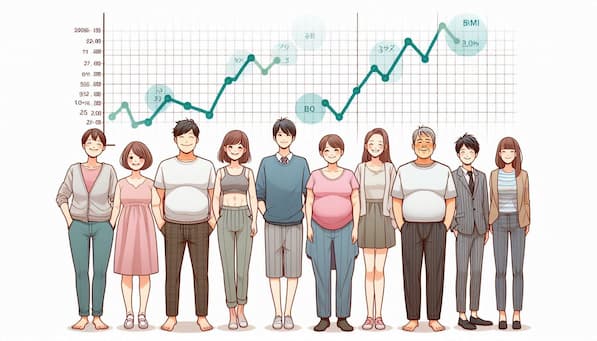
Japan is often viewed as a global leader in health and longevity. Behind this reputation lies a blend of cultural practices, healthcare policies, and lifestyle habits that contribute to the country’s distinct Body Mass Index (BMI) and health trends. But what sets Japan apart, and what can other countries learn from its example?
Japan’s BMI at a Glance
BMI serves as a simple way to measure weight relative to height, helping to classify individuals as underweight, normal weight, overweight, or obese.
In Japan, the average BMI is 22–23, placing most of the population firmly within the “normal weight” category. However, Japan’s BMI thresholds differ slightly from global standards, with obesity defined as a BMI of 25 or above, compared to 30 or above in many Western countries.
Factors Contributing to Japan’s Unique BMI and Health Trends
1. Traditional Japanese Diet
The Japanese diet is renowned for its health benefits, emphasizing:
- Fresh fish: A rich source of omega-3 fatty acids.
- Rice and vegetables: Staples that are low in calories yet filling.
- Fermented foods: Items like miso and natto promote gut health.
These dietary habits not only help maintain lower BMIs but also contribute to reduced rates of heart disease and diabetes.
2. Active Lifestyle
Daily life in Japan involves significant physical activity. Many Japanese people walk or cycle as part of their daily commute, and public transportation hubs encourage walking over driving.
This active lifestyle helps keep obesity rates low and promotes cardiovascular health.
3. Preventative Healthcare System
Japan’s healthcare system prioritizes prevention. The Metabo Law, for instance, requires adults aged 40–74 to undergo annual waistline measurements to identify risks of metabolic syndrome. This early detection approach ensures that potential health issues are addressed before they become severe.
4. Cultural Attitudes Towards Health
Cultural norms in Japan place a high value on maintaining a healthy weight. Slimness is often associated with discipline and self-control, and public awareness campaigns reinforce the importance of balanced eating and exercise.
Comparing Japan to Global Health Trends
Japan’s unique approach to BMI and health trends contrasts sharply with many Western countries:
- Obesity Rates: Japan’s obesity rate is 4%, one of the lowest in the world. In contrast, the U.S. has an obesity rate exceeding 36%.
- Life Expectancy: Japan boasts the highest life expectancy globally, at 85 years, compared to the global average of 73 years.
- Dietary Habits: While Japan’s traditional diet focuses on fresh and minimally processed foods, many Western diets are high in sugar, saturated fats, and processed ingredients.
These differences highlight how culture, diet, and lifestyle influence health outcomes on a national scale.
Challenges Facing Japan’s Health System
Despite its successes, Japan faces its own set of challenges:
- Aging Population: Japan has one of the world’s oldest populations, placing a strain on healthcare resources.
- Pressure to Stay Slim: Cultural ideals around slimness can lead to unhealthy weight loss practices, especially among young women.
Efforts are underway to address these issues while maintaining Japan’s impressive health standards.
Lessons from Japan’s Health Model
Countries looking to improve public health can draw inspiration from Japan’s:
- Focus on Prevention: Early detection and intervention are key to reducing healthcare costs and improving outcomes.
- Balanced Diet: Emphasizing fresh, whole foods can reduce rates of obesity and related illnesses.
- Active Urban Design: Creating walkable cities and promoting cycling can encourage healthier lifestyles.
Conclusion
Japan’s unique BMI and health trends are the result of a harmonious combination of cultural practices, dietary habits, and proactive healthcare policies. While no system is perfect, Japan’s approach offers valuable insights into achieving better public health outcomes.
For more information about BMI trends in Japan, visit our detailed article on BMI in Japan.
Key Takeaways
- Japan’s average BMI is 22–23, supported by a healthy diet and active lifestyle.
- The country’s preventative healthcare system ensures early intervention.
- Japan’s low obesity rates stand in stark contrast to global trends, highlighting the impact of culture on health.
Related to BMI in Japan:
- Average BMI in Japan
- Japan’s Ideal BMI vs Western Standards
- Japan’s BMI Standards for Kids
- Japan’s Longevity and BMI
External Resources:
- WHO: Body Mass Index Information
- Japan Ministry of Health: National Health Surveys














